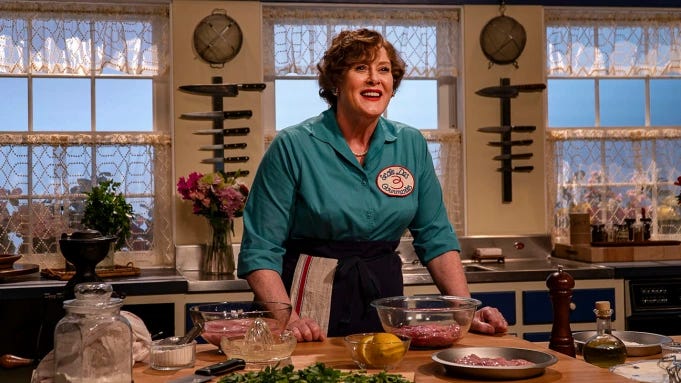On Looking At HBO Max's "Julia"
When I found out HBO Max was running a TV series about the making of Julia Child’s classic show, The French Chef, I was intrigued. From the first episode, I’ve been hooked.
A lot of us have seen Nora Ephron’s swan song, Julie and Julia (read my blog post on the film here). Admittedly, it isn’t Ephron’s best film, but there’s something satisfying about the characters discovering rich but simple living through food. The actors, of course, put in wonderful performances and the food looks decadent.
Julia is almost a sequel to Julie and Julia in that it picks up just around where the film left off. I like that it doesn’t try to tell every single detail of Julia’s life and the process of making The French Chef, but just gives some main ideas.
I also like that the series presents a very nuanced view of Julia and her life. Biopics so often focus on the ta-da as opposed to the journey, and Julia shows its title character awkward and nervous at being on camera, rehearsing in her kitchen and dining room at home, figuring out how to loosen up, wondering which camera to look at next. It also shows how many people it took to make the show what it was and how her family and friends encouraged her.
Madame Child is gracefully and joyfully played by Sarah Lancashire, who wears the part like a glove. The show emphasizes Julia’s sense of humor and how much her manner inspired confidence in everyone around her, especially Alice (Brittany Bradford), who was loosely based on actual French Chef producer Ruth Lockwood. This woman goes from hunching over her clipboard to striding around getting things done with a smile and a firm handshake.
Lancashire is ably matched by David Hyde Pierce as Paul, who, while supportive of his wife’s success, has to struggle with living in her shadow and sharing her with the world, which got tougher and tougher when it became clear that the show would eventually go national.
Still, Paul rises to the occasion. Literally, albeit by association. In the “French Bread” episode, Julia has to reshoot an installment of her show while also developing the second volume of Mastering the Art of French Cooking. Since she can’t be everywhere at once, Paul and Julia’s publisher, Judith Jones (Fiona Glascott) were tasked with finding the best way to bake proper French bread in an American home oven. The jam-packed week of taping and reworking is interspersed with scenes of Paul and Judith trying, failing, and finally succeeding, while the “Servant’s Chorus” from My Fair Lady lilts over the scenes.
Naturally, Julia, Paul, and Judith all go out for Chinese food at the end of their ordeal because who wants to cook after entire days of being knee-deep in flour and yeast?
The show nicely nails the time period. It’s been decades since a TV was considered a piece of furniture and people wanted their sets to match their decor. It’s also been decades since celebrity chefs and public television became ubiquitous. Julia effectively presents an era that’s getting further and further in the rearview mirror without being heavy-handed.
Well, for the most part, anyway. There’s a bit of profanity because HBO, even though we know Julia wasn’t a fan (see her reaction to Julie Powell), and the show sacrifices historical accuracy in favor of inclusivity, although it’s not in-the-face.
Small beefs aside, I have to give kudos to HBO Max for releasing one episode per week as opposed to blasting the whole season off at one go, because a show like Julia begs to be savored and then repeated. I sincerely hope there’s a second season.
Julia is currently available to stream on HBO Max. Rated TV-MA.
Created by David Goldfarb
Stars: Sarah Lancashire, David Hyde Pierce, Brittany Bradford, Fiona Glascott, James Cromwell, Bebe Neuwirth, Fran Kranz
My grade: A




